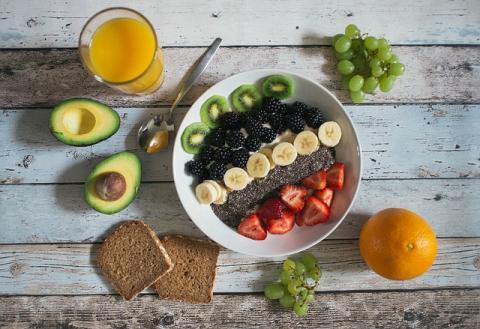
Some things are hailed as “superfoods” only to get debunked when further research is done. Other foods bounce on and off the good-for-you list—one week you’re enjoying them and the next you’re avoiding them. With all the confusion surrounding healthy eating, trying anything with so much hype surrounding it can be intimidating.
Although the term “superfood” sounds hyperbolic, there really are a number of foods with overwhelmingly positive benefits that can make a big difference to your health in relatively small quantities. Here are a few that can be easily worked into your diet starting today.
1. Avocados: These are high in fat, but it’s the good kind of fat you shouldn’t avoid: monounsaturated fat reduces your risk of cancer, heart disease, and diabetes. They also contain plenty of fiber to fill you up, as well as lutein, an antioxidant that’s great for your eyes and skin. Try guacamole with taro, plantain, or yucca chips, or add avocado to your sandwich or salad.
2. Wild salmon: This is one of the best fish you can get—not only does salmon contain more omega-3s than most fish, it also doesn’t come with significant mercury risks like some fish do. Omega-3s are essential for heart health, and they’ll give you healthy skin and shiny hair. The American Heart Association recommends eating fish at least twice a week. If you can’t work that into your life every week, fish oil supplements can help.
3. Mushrooms: Mushrooms have been used in some Eastern medicine for centuries—and for good reason. They’re great for your immune system and help prevent and even treat high blood pressure and high cholesterol, in addition to containing lots of essential minerals. Try some on flatbread pizza or as an addition to a salad or stir-fry.
4. Almonds: More than just a tasty snack, these little miracles can actually help you lose weight, since the fiber they contain helps you feel full and prevents overeating. Almonds are high in the good fat that promotes heart health and they contain lots of energy-giving protein. When you feel that 3pm crash coming on, do yourself a favor and grab a handful of these instead of hitting up a vending machine.
5. Eggs: The back-and-forth battle of whether or not eggs are good for you has been settled: they are. Touted as one of the world’s best protein sources—better than milk, beef, or soy—they give you the energy you need to get through the day. Eggs also contain all nine essential amino acids and lots of important nutrients. One caveat: don’t eat just the whites. The yolk contains cholesterol and more calories, but it also contains choline, which promotes heart, brain, and liver health. Enjoy the whole egg. Buy organic and free-range to get the best benefits.
6. Red wine: Lots of us got excited when red wine landed on the good-for-you list, and fortunately, it’s there to stay. In fact, a (very) small daily dose of any kind of alcohol is actually good for your heart—it reduces the risk of blood clots and increases good cholesterol. However, red wine in particular is best, because it contains powerful antioxidants.
7. Coffee: This is an item that’s been debated about for a long time, and the verdict is that it’s good for you—as long as you drink it in moderation. Studies have shown that coffee can help prevent Parkinson’s disease, diabetes, and liver cancer. It also has a high concentration of antioxidants. To avoid excesses of cream and sugar, experiment with different bean varieties until you find something you like on its own.
8. Kale: This incredible vegetable isn’t played out, we promise. It contains a long list of essential vitamins, minerals, and antioxidants to keep you healthy and prevent a litany of diseases. It’s also rich in filling fiber and lutein for your eyes and skin. Kale is a great salad or soup component, or you can bake kale chips in your oven for an inexpensive and nutritious snack.
9. Greek yogurt: To get you started in the morning or keep you going between meals, pick up a cup of Greek yogurt. It’s thicker and creamier than regular yogurt, but the texture isn’t indicative of unhealthiness. Greek yogurt contains lots more protein and less sugar than regular yogurt, and it’s minimally processed, so you get all the healthy bacteria. Add fresh fruit to plain yogurt to make it even more nutritious.
10. Strawberries: These bright red berries are full of vitamin C and antioxidants to ward off illness, and they’ve even been shown to help your mind stay sharp. Vitamin C helps prevent wrinkles, too, as it’s crucial to the skin’s production of wrinkle-resistant collagen. Strawberries contain filling fiber and are naturally low in calories. Keep some in your fridge to snack on or add to dessert.
11. Coconut oil: Myth! While not the worst food ever, its health benefits aren’t great enough to justify all the hype. Pure virgin coconut oil contains high levels of saturated fat, so while it may have some health benefits, coconut oil is best consumed in moderation, if at all. That said, it’s definitely better for you than butter, but you’re still best off cooking with healthier oils like olive or grapeseed. Coconut oil is still great for topical use, though—check out our suggestions for DIY skincare!








